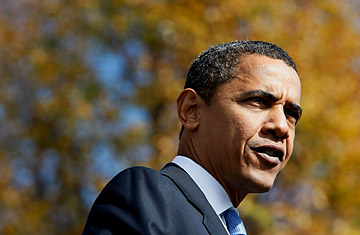
Barack Obama speaks at a campaign rally.
Watching Barack Obama campaign the last few days of this election is a bit like watching the last five minutes of Chariots of Fire, on loop, or any other sports movie where the underdog winds up triumphant. One appreciates the scene more having seen the back story and the main character's struggles to get where he is. But even for those just tuning in, the scene is rousing: swooning crowds that number in the hundreds of thousands, a who's who of Democratic lions speaking on his behalf, soaring music, some of it played live by the rock stars who originated it. The only thing missing is the fireworks.
Of course, these spectacles are carefully orchestrated by the campaign to underline Obama's momentum going into election day. The venues are picked to maximize the impact on early voting in swing districts of states won by George W. Bush in 2004. The crowds are a mix of long-time supporters and targeted fence sitters, though when you're pushing 100,000 it seems more like everyone and their brother. And the speeches are pure gravy: light on policy and full of Obama's greatest hits, from variations on his 2004 Democratic National Convention line "We are more than a collection of Red States and Blue States; we are the United States of America," to his trademark riff, "Yes, we can!"
Obama's itinerary this past week has ignored John McCain's attempts to flip blue-leaning Pennsylvania and instead focused on former GOP strongholds, such as southern Virginia, the dusty suburbs of Las Vegas and the rural southwestern corner of Missouri. Obama's closing strategy to win these Red states focuses on exurban and rapidly growing areas. He's not looking for victories in these counties, merely to improve his showing there enough to put him over the top in the state when added to record turnout in Democratic-heavy areas. "Like in Jacksonville [Florida, where Obama heads on Monday], there's a big chunk of folks that just don't participate for some reason in Democratic elections. A stop there, and a visit by us coordinated with trying to get folks out to vote early, has a way of not just changing the percentage within an area but changing the importance of that area as it relates to Democratic voters," says Robert Gibbs, Obama's communications director. "In other words, if you've got an area where Democrats normally comprise 20% of the vote, and you normally lose it 55-45, and you go there, it raises the importance of the area with swing voters and changes the underlying numbers as well. It's a two for one."
Courting sporadic Democrats in addition to independent and swing voters makes for diverse audiences both in age and race. Careful to be inclusive, Obama rarely mentions "Republicans" or "Democrats" except to tell audiences how he'd bring them together. The rallies have also been some of the largest in a campaign known for record-breaking crowds. At most events there is a carefully cultivated atmosphere of history-in-the making, inspiring tens of thousands of people to line up for hours, many taking the day off work or pulling their children out of school for the event. In pouring rain and baking tarmacs they groove to Jackie Wilson's "Your Love Is Lifting Me Higher" and "I'll Take You There," by Mavis Staples in between speeches by local politicians.
Bruce Springsteen is scheduled to open for Obama in Cleveland on Sunday. Former President Bill Clinton introduced him in Kissimmee, Florida, on Wednesday. And on Friday Obama became the first presidential candidate to inspire Al and Tipper Gore back on the campaign trail in Florida, the state that cost Gore the presidency in 2000. Returning to the hotel in Kissimmee Wednesday night, the traveling press were surprised to find actor Jimmy Smits — who played a presidential candidate roughly based on Obama in the final season of the The West Wing. Smits had also been stumping for Obama that day, one of dozens of Hollywood stars hitting college campuses and coffee houses for Obama across the country. As one Obama aide describe it to me, they're "pulling out the big guns and holding nothing back."
Afraid of a repeat of his surprise loss in the New Hampshire primary, one of the first things Obama does is to ask for a show of hands of people who have already voted. He then asks these supporters to take note of those in the crowd who still need to vote and to get them to the polls. "We can't afford to slow down, sit back or let up for one day, one minute, or one second in these last few days," Obama says, as he did to a crowd of 25,000 in Des Moines, Iowa, Friday. "Not now. Not when so much is at stake."
Aides say that Obama in these final days is content in the knowledge that he has done everything he could to win this race, given his all — or, to use an oft-quote sports analogy, left everything on the field. If he loses, they say, his worry won't be about what he could have done differently but about the generation of young voters that he has inspired and the opportunity the country may have lost in keeping them engaged.
(See photos of both Barack Obama and John McCain's final days on the campaign trail)
